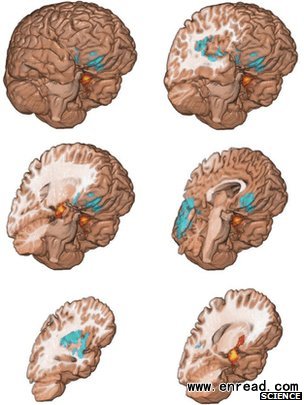毒瘾可能与大脑畸形有关
Abnormalities in the brain may make some people more likely to become drug addicts, according to scientists at the University of Cambridge.
剑桥大学的科学家称,大脑某些部位畸形的一部分人更容易染上毒瘾。

Red areas show parts of the brain more active in drug users. Blue regions are abnormally decreased in drug users.
The study, published in the journal Science, suggested addiction is in part a "disorder of the brain".
Other experts said the non-addicted siblings offered hope of new ways of teaching addicts "self-control".
It has long been established that the brains of drug addicts have some differences to other people, but explaining that finding has been more difficult.
Experts were unsure whether drugs changed the wiring of the brain or if drug addicts' brains were wired differently in the first place.
This study, funded by the Medical Research Council, attempted to answer that by comparing the brains of 50 cocaine or crack addicts with the brain of their brother or sister, who had always been clean.
Both the addicts and the non-addict siblings had the same abnormalities in the region of the brain which controls behaviour, the fronto-striatal systems.
The suggestion is that these brains may be "hard-wired" for addiction in the first place.
Lead researcher Dr Karen Ersche said: "It has long been known that not everyone who takes drugs becomes addicted."
She told the BBC: "It shows that drug addiction is not a choice of lifestyle, it is a disorder of the brain and we need to recognise this."